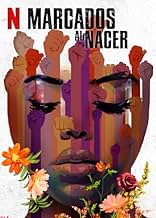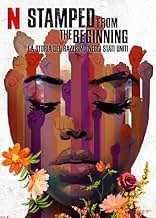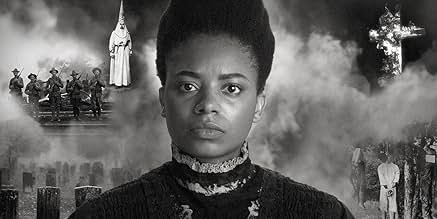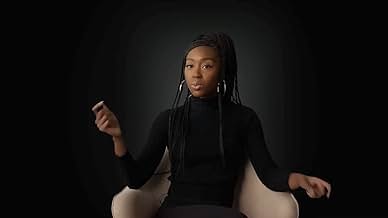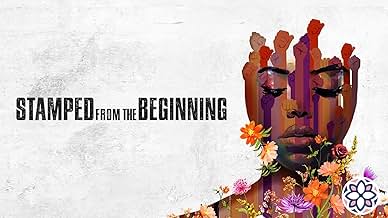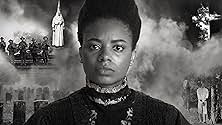AVALIAÇÃO DA IMDb
6,7/10
1,4 mil
SUA AVALIAÇÃO
Com técnicas de animação inovadoras e depoimentos de especialistas, este documentário baseado no premiado best-seller explora a história das ideias racistas nos EUA.Com técnicas de animação inovadoras e depoimentos de especialistas, este documentário baseado no premiado best-seller explora a história das ideias racistas nos EUA.Com técnicas de animação inovadoras e depoimentos de especialistas, este documentário baseado no premiado best-seller explora a história das ideias racistas nos EUA.
- Direção
- Roteiristas
- Artistas
- Indicado para 1 Primetime Emmy
- 2 vitórias e 10 indicações no total
Leer Leary
- Abraham Lincoln
- (narração)
David Goldstein
- Boston Elite
- (narração)
- Direção
- Roteiristas
- Elenco e equipe completos
- Produção, bilheteria e muito mais no IMDbPro
Avaliações em destaque
Imagine what you'd do, in a world that's against you, where the prejudice and hate, controls your life and dominates, where the boundaries are so narrow, for you to plough your freedom farrow, and the clichés mould and form, to show you're nothing like their norm. Imagine what you'd do, controlled by those without a clue, as untruths are formed and conjured, by the government incumbent, who's intent to lend a hand, is cloaked with aims to keep command, as the message keeps repeating, cascades through generations reaping. Imagine what you'd do...
A powerful and thought provoking piece of documentary filmmaking.
A powerful and thought provoking piece of documentary filmmaking.
As "Stamped from the Beginning" (2023 release; 92 min.) opens, the off-camera interviewer opens with this question: "What's wrong with Black people?". The (Black) talking heads are stunned with this question. We then go back in time to when Blacks were forced (basically kidnapped) to the US. At this point we are less than 10 minutes into the documentary.
Couple of comments: this is the latest documentary from Black director Roger Ross Williams. More importantly, this is the movie adaptation of the 2016 acclaimed book of the same name by Dr. Ibram X. Kendi, who himself is among the most interviewed talking heads. Along the way we get to know some historic figures whom I was not familiar with. The documentary is fast-paced, and well illustrated, but of course at times is difficult to watch, even if it is must-see for sure. I moved to the US many years ago, and am still learning every day about the dark past (and sadly, also present) of this country.
"Stamped from the Beginning" started streaming on Netflix last week, and I just caught up with it. There is good reason why this documentary is currently rated 100% Certified Fresh on Rotten Tomatoes. If you have any interest in social justice and the correlating origins of Black racism, I'd readily suggest you check this out and draw your own conclusion.
Couple of comments: this is the latest documentary from Black director Roger Ross Williams. More importantly, this is the movie adaptation of the 2016 acclaimed book of the same name by Dr. Ibram X. Kendi, who himself is among the most interviewed talking heads. Along the way we get to know some historic figures whom I was not familiar with. The documentary is fast-paced, and well illustrated, but of course at times is difficult to watch, even if it is must-see for sure. I moved to the US many years ago, and am still learning every day about the dark past (and sadly, also present) of this country.
"Stamped from the Beginning" started streaming on Netflix last week, and I just caught up with it. There is good reason why this documentary is currently rated 100% Certified Fresh on Rotten Tomatoes. If you have any interest in social justice and the correlating origins of Black racism, I'd readily suggest you check this out and draw your own conclusion.
Must see for all to understand the real history of the United States and how it's wealth and European wealth is built on the backs and blood of Atlantic slave trade and colonization. The film is not complete but should inspire everyone esp young people to learn about institutions and systems that propagate injustice and oppression. Wars in Middle East, Africa, civil unrest, poverty, mass shootings, mass incarceration, migrant crisis etc can be better understood in light of racist doctrines and policies created by Europeans since the 16th century. Read about the Doctrine of Discovery and Age of Exploration.
I quite like Kendi's book, and when I saw this pop up on Netflix I clicked it instantly, looking forward to see a documentary visualize the content of the book in an engaging manner.
Sadly, it's honestly harder to follow than expected, even for someone who has read the book. Williams' direction led to extreme over-editing, and the lack of captions or context for what you are looking at in the montages leads to frequent confusion and annoyance.
To be clear, I understand the logic behind Williams' editing style--but it still doesn't work. What he was going for was to try to amplify the continuities of 17th century racism to racism today, which is fitting with Kendi's main thesis. But in terms of documentary style, it goes a little 'too extra' even to that end, mixing together speeches, films, historical footage, contemporary news footage, highly stylized reenactments... to the extent that at any given montage, you could go a solid three minutes not being sure what CENTURY the footage you're looking at is coming from, let alone decade, or whether it was real footage or fiction.
If you were an educator, and wanted to have a conversation about Kendi's ideas, but hadn't assigned the full book, should you show this to your class instead? No, absolutely not -- this documentary will be annoying and confusing if you aren't already familiar with Kendi's point, and honestly, even if you agree with Kendi's thesis you might even then find much to dislike.
For instance, consider the 7 minute sequence from about 11 minutes into the documentary to the 18 minute mark, on Bacon's rebellion. Could your students answer the following questions: -What century was Bacon's rebellion in?
-What was Bacon's rebellion about?
-What was the outcome of Bacon's rebellion?
No--because Bacon's rebellion is just an incident mentioned in support of the idea that whiteness was invented to prevent poor whites from allying with poor blacks. You might be able to follow the point the documentary is trying to make, but the result is that, unless you already know the example, you would completely lose sense of historical trajectory or continuity because the documentary tells you so little contextualized information.
Now you might say--oh they didn't have time to go into all this context on the example. But they used two minutes right after introducing Bacon's Rebellion to give a four-century spanning montage of depictions of racism... instead of giving almost any basic context about the example of Bacon's rebellion or its relevance to the argument.
A lot of the montages, for that matter, feel... conspiratorial? What I mean by this is that again, they're not really making articulated connections; they're not even naming the people in the photos, so either you 'get it' or you don't--but isn't the point of a documentary to make it so that people unfamiliar with the subject will understand? There's no names given when someone's face pops up on screen, and the faces and names go by so fast even someone highly educated is likely to be left wondering "wait who was that guy..?"
Basically, even in a classroom setting where you had already read Kendi's book... I honestly feel like this documentary would do more harm to comprehension than good.
Sadly, it's honestly harder to follow than expected, even for someone who has read the book. Williams' direction led to extreme over-editing, and the lack of captions or context for what you are looking at in the montages leads to frequent confusion and annoyance.
To be clear, I understand the logic behind Williams' editing style--but it still doesn't work. What he was going for was to try to amplify the continuities of 17th century racism to racism today, which is fitting with Kendi's main thesis. But in terms of documentary style, it goes a little 'too extra' even to that end, mixing together speeches, films, historical footage, contemporary news footage, highly stylized reenactments... to the extent that at any given montage, you could go a solid three minutes not being sure what CENTURY the footage you're looking at is coming from, let alone decade, or whether it was real footage or fiction.
If you were an educator, and wanted to have a conversation about Kendi's ideas, but hadn't assigned the full book, should you show this to your class instead? No, absolutely not -- this documentary will be annoying and confusing if you aren't already familiar with Kendi's point, and honestly, even if you agree with Kendi's thesis you might even then find much to dislike.
For instance, consider the 7 minute sequence from about 11 minutes into the documentary to the 18 minute mark, on Bacon's rebellion. Could your students answer the following questions: -What century was Bacon's rebellion in?
-What was Bacon's rebellion about?
-What was the outcome of Bacon's rebellion?
No--because Bacon's rebellion is just an incident mentioned in support of the idea that whiteness was invented to prevent poor whites from allying with poor blacks. You might be able to follow the point the documentary is trying to make, but the result is that, unless you already know the example, you would completely lose sense of historical trajectory or continuity because the documentary tells you so little contextualized information.
Now you might say--oh they didn't have time to go into all this context on the example. But they used two minutes right after introducing Bacon's Rebellion to give a four-century spanning montage of depictions of racism... instead of giving almost any basic context about the example of Bacon's rebellion or its relevance to the argument.
A lot of the montages, for that matter, feel... conspiratorial? What I mean by this is that again, they're not really making articulated connections; they're not even naming the people in the photos, so either you 'get it' or you don't--but isn't the point of a documentary to make it so that people unfamiliar with the subject will understand? There's no names given when someone's face pops up on screen, and the faces and names go by so fast even someone highly educated is likely to be left wondering "wait who was that guy..?"
Basically, even in a classroom setting where you had already read Kendi's book... I honestly feel like this documentary would do more harm to comprehension than good.
This was one of the most creative and informative documentaries about racism in our country. The various clips and illustrations and music made the film engaging. The narrators were incredible in their presentation and accuracy. The author of the book that was the basis for this film delved into the history behind the history. It shows that racism is a false construct and needs to be confronted on a daily basis. I am recommending this to my children and my friends. My hope is that this will help change people's attitudes and help us all realize that prejudice is still very present in our country and culture. These very learned scholars and presenters enlightened my awareness and I am deeply grateful they made this documentary.
Principais escolhas
Faça login para avaliar e ver a lista de recomendações personalizadas
- How long is Stamped from the Beginning?Fornecido pela Alexa
Detalhes
- Data de lançamento
- País de origem
- Central de atendimento oficial
- Idioma
- Também conhecido como
- Stamped from the Beginning
- Locações de filme
- Empresas de produção
- Consulte mais créditos da empresa na IMDbPro
- Tempo de duração1 hora 31 minutos
- Cor
- Mixagem de som
Contribua para esta página
Sugerir uma alteração ou adicionar conteúdo ausente


